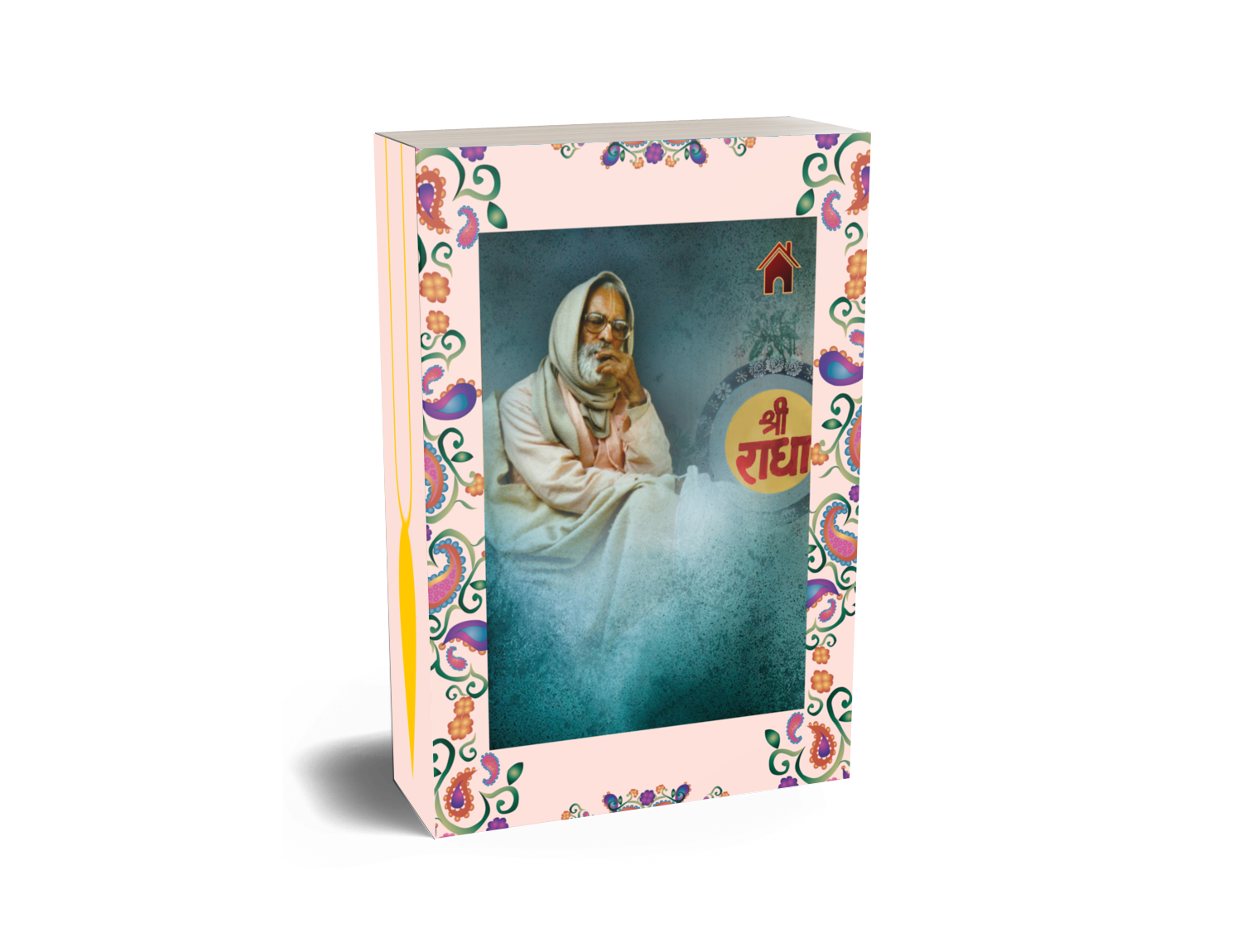

The following is an excerpt from a conversation between Śrīla Bhakti Rakṣaka Śrīdhara Mahārāja and a devotee, in Navadvīpa, India on May 28, 1983 (www.rupanugabhajanashram.com/writings/krishna-talk-articles/swami-bv-giri/harmony-real-and-apparent/)
[Śrīla Bhakti Rakṣaka Śrīdhara Mahārāja was once approached by a despondent devotee who lamented that he could not understand why there were so many differences between different Vaiṣnava groups.]
Devotee: Why couldn’t they all just get along?
Śrīla Bhakti Rakṣaka Śrīdhara Mahārāja: So many things are to be understood. Kṛṣṇa is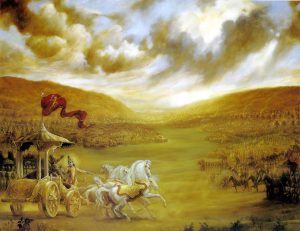 the cause of Kurukṣetra fighting, do you know that? In His presence the whole Yadu-vaṁśa was finished and He was a sightseer. What is that? Can you understand this? How can you adjust? What is the difference between Kṛṣṇa and Balarāma? Why does Balarāma side with Duryodhana and Kṛṣṇa side with the Pāṇḍavas? Why? They are almost one and the same! What is your answer? All is bogus?
the cause of Kurukṣetra fighting, do you know that? In His presence the whole Yadu-vaṁśa was finished and He was a sightseer. What is that? Can you understand this? How can you adjust? What is the difference between Kṛṣṇa and Balarāma? Why does Balarāma side with Duryodhana and Kṛṣṇa side with the Pāṇḍavas? Why? They are almost one and the same! What is your answer? All is bogus?
Fighting is life! Fighting is life! I must turn and preach this. Until and unless I can change my understanding, physical oneness is not one. To maintain physical peace is a lack of vitality. We must be true to our own understanding. You want to crush everything – jumble everything together into one mass. But that is all stone, fossilized. Do you want to see a fossilized unity? What is the conception of harmony? Harmony means independent thinking.
There are different rasas – Kṛṣṇa is not representing only one feature. He is of infinite  features to accommodate infinite possibilities. That is Akhila-rasāmṛta-murti – there are different groups and in the same group there are so many different arrangements. Rādhārāṇī and Candrāvalī are fighting – two camps fighting to satisfy Him. We have to understand how it is possible. With humility we have to try to follow how it is possible. The opposition party is there in the parliament to enhance the work of the main party. In this way direct and indirect make everything complete. And if that is distributed everywhere, then there will be no difficulty to understand the differences there.
features to accommodate infinite possibilities. That is Akhila-rasāmṛta-murti – there are different groups and in the same group there are so many different arrangements. Rādhārāṇī and Candrāvalī are fighting – two camps fighting to satisfy Him. We have to understand how it is possible. With humility we have to try to follow how it is possible. The opposition party is there in the parliament to enhance the work of the main party. In this way direct and indirect make everything complete. And if that is distributed everywhere, then there will be no difficulty to understand the differences there.
Śaṅkara and Buddha preferred that the ultimate goal is undifferentiated, unknown and unknowable. All harmonised into death. That is brahma-nirvāṇa or prākṛti-nirvāṇa. Their brain went so far, but the final piece – no differentiation, no trouble – all bathed in eternal slumber. If you prefer, you can follow that school.

The following is a transcription of a lecture delivered by Śrīla Bhaktivedānta Nārāyaṇa Mahārāja in Los Angeles, California, on June 5, 1998, published in Harmony (Source: Purebhakti.com)
Once I was in Āsāma with my Gurudeva, Śrīla Bhakti Prajñāna Keśava Gosvāmī Mahārāja. At that time, there were about forty brahmacārīs and ten sannyāsīs in our group. One day, one of the brahmacārīs gave a class and said that all householders are rotten. He told his audience, “Householders have nothing to do with bhakti. We brahmacārīs and sannyāsīs are strong. We can preach and do bhakti, but these rotten householders cannot.”
None of the sannyāsīs were in the class when the brahmacārī spoke in that way, but we 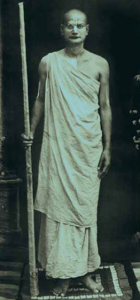 heard about it afterwards and informed Śrīla Gurudeva. He at once became furious and told that brahmacārī, “You are rotten. You have no connection with bhakti. You don’t know any siddhānta. Most of our ācāryas were married, and so was Kṛṣṇa Himself, because He married in Dvārakā. Śrī Caitanya Mahāprabhu, Śrīnivāsa Ācārya, and all of the gopīs were married. Are they rotten? The Pāṇḍavas were householders. Are they rotten? Oh, you are especially rotten. You are not even a Vaiṣṇava. I don’t think you have taken initiation at all.”
heard about it afterwards and informed Śrīla Gurudeva. He at once became furious and told that brahmacārī, “You are rotten. You have no connection with bhakti. You don’t know any siddhānta. Most of our ācāryas were married, and so was Kṛṣṇa Himself, because He married in Dvārakā. Śrī Caitanya Mahāprabhu, Śrīnivāsa Ācārya, and all of the gopīs were married. Are they rotten? The Pāṇḍavas were householders. Are they rotten? Oh, you are especially rotten. You are not even a Vaiṣṇava. I don’t think you have taken initiation at all.”
After this incident, everyone became very careful, understanding that advancement in bhakti depends only on bhakti itself.
yei bhaje sei baḍa, abhakta — hīna, chāra
kṛṣṇa-bhajane nāhi jāti-kulādi-vicāra
Śrī Caitanya-caritāmṛta, Antya-līlā (4.67)
Anyone who takes to devotional service is exalted, but nondevotees are always condemned and abominable. Advancement in bhakti has nothing to do with family prestige and one’s position in society.
kibā vipra, kibā nyāsī, śūdra kene naya
yei kṛṣṇa-tattva-vettā, sei ‘guru’ haya
Śrī Caitanya-caritāmṛta, Madhya-līlā (8.128)
One may be a brāhmaṇa, a sannyāsī, or even a śūdra. In any case, no matter what his status is, if he really knows the science of Kṛṣṇa, he is actually guru.
One may be a gṛhastha, a brahmacārī, a sannyāsī, or in any position. If he knows the established philosophical truths – the philosophy of the love and affection that was taught by Śrī Caitanya Mahāprabhu – he is a pure Vaiṣṇava.
Everyone in our line – from Śrī Caitanya Mahāprabhu to parama-pūjyāpāda Śrīla Bhaktivedānta Svāmī Mahārāja and myself – takes this view. We do not think, “All the gṛhasthas are rotten, and they have nothing to do with bhakti.”
In fact, I actually prefer the gṛhastha devotees if they are more polite than the sannyāsīs. 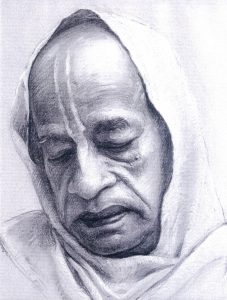 Sannyāsīs sometimes have a great false ego and think, “I am learned. I am a sannyāsīs.” if they have this conception, they are sure to fall down. All the sannyāsīs with such false egos have fallen down. They may return to the path of bhakti if they have not offended any Vaiṣṇava, and if they have not left the teachings of Śrīla Bhaktivedānta Svāmī Mahārāja and his paramparā; that is, the Vaiṣṇava line coming from Śrīla Rūpa Gosvāmī. However, those who are offending their guru and other Vaiṣṇavas cannot return.
Sannyāsīs sometimes have a great false ego and think, “I am learned. I am a sannyāsīs.” if they have this conception, they are sure to fall down. All the sannyāsīs with such false egos have fallen down. They may return to the path of bhakti if they have not offended any Vaiṣṇava, and if they have not left the teachings of Śrīla Bhaktivedānta Svāmī Mahārāja and his paramparā; that is, the Vaiṣṇava line coming from Śrīla Rūpa Gosvāmī. However, those who are offending their guru and other Vaiṣṇavas cannot return.
It is very harmful for any sannyāsī, brahmacārī, or gṛhastha to offend a Vaiṣṇava. I think that for the most part gṛhastha do not commit offences, because they are afraid of what will happen if they do so. But nowadays sannyāsīs and brahmacārīs are not at all afraid of committing offences; in fact many are desperate to commit offences. They commit offences one after another, again and again. They have no fear at all, whereas gṛhastha are somewhat polite and think, “We don’t know anything. We are in family life, so we don’t have so much association with high-class Vaiṣṇavas.” Consequently, they respect Vaiṣṇavas.
Householders are more tolerant and advanced in devotion to Kṛṣṇa than many modern sannyāsīs. They cannot give up the renounced order and fall down, because they have not accepted the renounced order in the first place.
Sannyāsīs sometimes give up their renunciation. They tell others to be careful regarding women and to give up their wives and children. Then, after saying this, they themselves become lusty and associate with women in the mood of sensual enjoyment. Sometimes a preacher may say as a point of reference, “Don’t be lusty, don’t be angry,” without criticizing anyone. But if he criticizes others, then all the bad qualities that he describes will come on his head and in his heart.
Always glorify Kṛṣṇa, Gurudeva, the Vaiṣṇavas, the pastimes of Mahāprabhu, and especially the pastimes of Nityānanda Prabhu. Be careful. Do not criticize even if one does something to be criticized.

The following is an excerpt of a lecture on Śrīmad-Bhāgavatam 4.8.34 delivered by Śrīla Gaura Govinda Svāmī Mahārāja in Śrīdhāma Māyāpura, West Bengal, India, on 21 February 1995 (http://tvpbooks.com/2016/11/srila-prabhupadas-society-without-envy/)
Devotee 1: I appreciate very much that you explained to us how Śrīla Prabhupāda’s purpose is to create a society without envy.
Śrīla Gaura Govinda Svāmī Mahārāja: That I quoted from Prabhupāda’s purport from Śrīmad-Bhāgavatam.
Devotee 1: We see that amongst devotees that are most advanced, the principle is tṛṇād api sunīcena taror iva sahiṣṇunā. It’s not an artificial thing to actually believe…
Śrīla Gaura Govinda Svāmī Mahārāja: That is not artificial, bābā! How many days can you act like that before your real svarūpa is revealed? How many days can it go on artificially? However for a Vaiṣṇava this type of humility is quite natural.
Devotee 1: My question is, Śrīla Prabhupāda has said that even if one does not have the practical vision that Kṛṣṇa is behind, in and connected to everything, but understands this theoretically, then he is a devotee who is rightly situated.
Śrīla Gaura Govinda Svāmī Mahārāja: Rightly situated? One who sees theoretically is rightly situated?
Devotee 1: But if one has theoretical understanding that he has gotten from the words of the spiritual master, then one is rightly situated. So in your class, though, you said that only the topmost devotee can be compassionate.
Śrīla Gaura Govinda Svāmī Mahārāja: Yes, only one who sees Kṛṣṇa.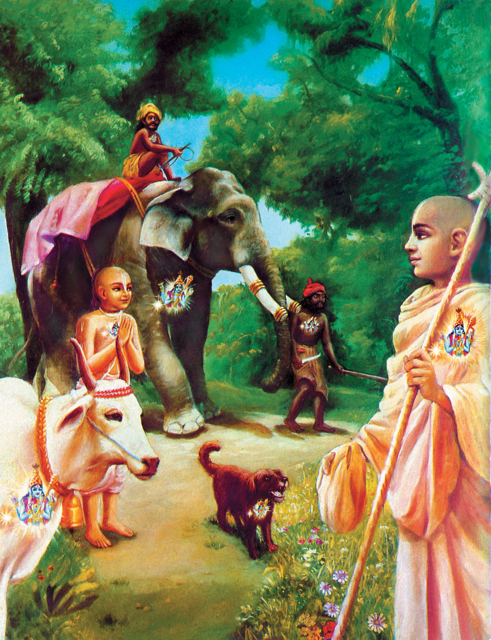
Devotee 1: Does that mean no one else can be compassionate?
Śrīla Gaura Govinda Svāmī Mahārāja: One may be compassionate to fulfil his own selfish desires. He may be compassionate to some and not compassionate to others. He has rāga and dveṣa, liking and disliking. He is not equal to one and all. He cannot be. Unless one sees Kṛṣṇa, how can he be compassionate? When he sees so many jīvas suffering his heart bleeds. He cannot sit tight. He will go out and preach Kṛṣṇa consciousness. And who preaches? Prāṇa āche yānra, se hetu pracāra, one who has life preaches! What is life? Jīvanaṁ sarva-bhūteṣu, Kṛṣṇa says, “I am the life in all living entities”***.
One who sees Kṛṣṇa everywhere, who sees Kṛṣṇa’s jīva suffering because of forgetfulness of Kṛṣṇa, because of a lack of Kṛṣṇa consciousness, he has prāṇa, life. That person goes out and preaches. He is completely surrendered to Kṛṣṇa. For this reason Kṛṣṇa came as Mahāprabhu, as a bhakta, a devotee: to teach devotion and how to surrender to Kṛṣṇa. Śikhāya śaraṇāgati bhakatera prāna, śaraṇāgati is the life of the devotee who is completely surrendered. By such surrender, Kṛṣṇa accepts him, kṛṣṇa tāre kore ātma-sama**. Prāṇa āche yāra sei hetu pracāra, he has life, therefore he goes out and preaches. Otherwise, who can preach if he has no life? How can one preach unless one sees Kṛṣṇa, and sees Kṛṣṇa’s jīva suffering? He does not want anyone to suffer. Everyone should be Kṛṣṇa conscious.
Devotee 2: Mahārāja, a madhyama-adhikārī has strong faith in the process of Kṛṣṇa consciousness but he does not have very extensive knowledge of the scriptures. How can he preach without that?
Śrīla Gaura Govinda Svāmī Mahārāja: He should get such knowledge by associating with an uttama-adhikārī. The madhyama-adhikārī is very fortunate, mahā-bhāgyavān, because he has strong faith in the words of sādhu-śāstra-guru and in Kṛṣṇa. He puts faith in the words of Kṛṣṇa and sādhus, those who are mahājanas, and speak what Kṛṣṇa has said. Ādau śraddhā, the first thing is one’s faith. That is most important.
Devotee 3: If an uttama-adhikārī wants to preach, generally he comes down to the level of madhyama and acts like a madhyama.
Śrīla Gaura Govinda Svāmī Mahārāja: Yes. Otherwise he cannot preach, because an uttama-adhikārī sees moving and non-moving living entities, but he never sees the outward forms, he always sees Kṛṣṇa.
sthāvara-jaṅgama dekhe, nā dekhe tāra mūrti
sarvatra haya nija iṣṭa-deva-sphūrti*
Caitanya-caritāmṛta (Madhya 8.274)
He sees only Kṛṣṇa. He says, “O, this living entity is Kṛṣṇa’s devotee, he is engaged in 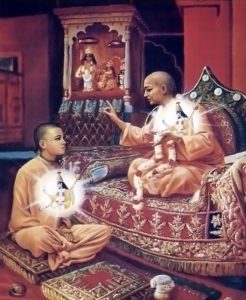 Kṛṣṇa’s service”. He never sees the outward form. His vision is completely different. He steps down to the madhyama platform, in order to speak. Otherwise how can he see that the jīva is suffering from a lack of Kṛṣṇa consciousness, from forgetfulness of Kṛṣṇa? Therefore, one who preaches steps down to madhyama-adhikārī, although he is uttama-adhikārī, otherwise he cannot preach. Those who are uttama-bhāgavatas, cannot preach. He sees only Kṛṣṇa. Therefore, one who preaches steps down to the madhyama platform, but he is not a madhyama as described here, śāstra-yukti nāhi jāne, who does not know śāstra. The uttama-adhikārī knows śāstra. An uttama-adhikārī who acts as a madhyama-adhikārī is not like the general type of madhyama-adhikārī, madhyama-bhakta. This madhyama-adhikārī is actually an uttama-adhikārī, but he has stepped down. He knows śāstra and he is very expert in presenting and quoting śāstric evidence, because, tasmāc chāstraṁ pramāṇaṁ te kāryākārya-vyavasthitau. This is śāstra-pramāṇa. What is to be done, kārya, and what is not to be done, akārya, how can we decide? Unless he presents śāstra-pramāṇa, how can he know what is to be done and what is not to be done? He is not a general, ordinary madhyama-adhikārī. He is uttama in madhyama.
Kṛṣṇa’s service”. He never sees the outward form. His vision is completely different. He steps down to the madhyama platform, in order to speak. Otherwise how can he see that the jīva is suffering from a lack of Kṛṣṇa consciousness, from forgetfulness of Kṛṣṇa? Therefore, one who preaches steps down to madhyama-adhikārī, although he is uttama-adhikārī, otherwise he cannot preach. Those who are uttama-bhāgavatas, cannot preach. He sees only Kṛṣṇa. Therefore, one who preaches steps down to the madhyama platform, but he is not a madhyama as described here, śāstra-yukti nāhi jāne, who does not know śāstra. The uttama-adhikārī knows śāstra. An uttama-adhikārī who acts as a madhyama-adhikārī is not like the general type of madhyama-adhikārī, madhyama-bhakta. This madhyama-adhikārī is actually an uttama-adhikārī, but he has stepped down. He knows śāstra and he is very expert in presenting and quoting śāstric evidence, because, tasmāc chāstraṁ pramāṇaṁ te kāryākārya-vyavasthitau. This is śāstra-pramāṇa. What is to be done, kārya, and what is not to be done, akārya, how can we decide? Unless he presents śāstra-pramāṇa, how can he know what is to be done and what is not to be done? He is not a general, ordinary madhyama-adhikārī. He is uttama in madhyama.
Devotee 3: One who has laukika-śraddhā should act under the guidance of one who has śāstrīya-śraddhā?
Śrīla Gaura Govinda Svāmī Mahārāja: Yes. You should have a bona fide Vaiṣṇava guru. You should do bhajana under his expert guidance. You should not act whimsically. Unless one has guru, how can he preach? Śravaṇa kīrtana. Preaching means kīrtana. Unless one has heard from a bona fide guru, what will he preach? He will only speak what he has heard, “I have heard this from authorities, from my guru”. Preaching is another name for śravaṇa, another name for hearing. “What I have heard I am repeating”. Therefore, only one who has heard can preach and do kīrtana. Otherwise, who can do kīrtana? One who has not heard, what will he say? Who will care to hear all those nasty things such a person may say?
Devotee 3: Guru Mahārāja, you explained that if you can’t see Kṛṣṇa, you should preach under the guidance of someone who can.
Śrī Śrīmad Gaura Govinda Svāmī Mahārāja: Yes.
Devotee 3: … and just simply repeat what you have heard.
Śrīla Gaura Govinda Svāmī Mahārāja: Yes, what you have heard, in that way your understanding will develop.
Devotee 3: because that is a form of śravaṇam?
Śrīla Gaura Govinda Svāmī Mahārāja: Yes, one should hear, śravaṇa. If you hear, premāñjana will be smeared on your eyes, and then you can see. Śrutekṣita-pathaḥ, śruta, hear and then see.
Devotee 4: So much preaching is going on and Prabhupāda’s books are there so I am  hearing that and I am repeating.
hearing that and I am repeating.
Śrīla Gaura Govinda Svāmī Mahārāja: Yes, repeat but don’t repeat like a parrot. A parrot is also repeating, but its words have no effect. You should get life first, and then preach. Then it will become effective.
Devotee 4: So Prabhupāda would say, “You judge a thing by its result”.
Śrīla Gaura Govinda Svāmī Mahārāja: Yes, by the result.
Devotee 4: So if we’re repeating what we have heard that means that if somebody asks us a question while we are preaching and we can’t answer it …
Śrīla Gaura Govinda Svāmī Mahārāja: When you can’t answer their question then they will never hear again from you, “He cannot answer my question”.
Devotee 3: A day when we have no bhāgavata-kathā we are starving.
Śrīla Gaura Govinda Svāmī Mahārāja: Bhāgavata-kathā is food for the hungry soul. If you do not take food, then how will you get life? Prāṇa āche yāṅra, se hetu pracāra, when one has prāṇa, he has life and therefore he preaches. If you cannot get food, how can you live? You will become skinny, weak, and have no life.
Devotee 5: Many disciples of Śrīla Prabhupāda were preaching under the orders of Śrīla Prabhupāda and, seeing the miseries of the people, were spreading Śrīla Prabhupāda’s teachings. Now many of them have stopped preaching.
Śrīla Gaura Govinda Svāmī Mahārāja: One who has life and sees Kṛṣṇa can never stop preaching. He sees “Kṛṣṇa’s jīva is suffering”. He will preach in spite of all obstacles. When Bhaktivinoda Ṭhākura became very old, he had to lift up his eyelids to see, but even at that age he would say, “I want to ride on a horse and go out and preach!” One whose heart bleeds, who has compassion, he will say such a thing. It is a question of compassion. Are you preaching out of compassion? If one is not preaching out of compassion, he may preach for some days, but then he stops. “I lost all my enthusiasm”. “O, why did you lose it? You lost Kṛṣṇa?”
*“The mahā-bhāgavata, the advanced devotee, certainly sees everything mobile and immobile, but he does not exactly see their forms. Rather, everywhere he immediately sees manifest the form of the Supreme Lord.” (http://www.vedabase.com/en/cc/madhya/8/274)
**“At the time of initiation, when a devotee fully surrenders unto the service of the Lord, Kṛṣṇa accepts him to be as good as Himself. (http://www.vedabase.com/en/cc/antya/4/192)
***I am the original fragrance of the earth, and I am the heat in fire. I am the life of all that lives, and I am the penances of all ascetics. (https://www.vedabase.com/en/bg/7/9)
 The following is an excerpt from an Evening Darśana with Śrīla Gaura Govinda Svāmī Mahārāja in Bhubaneswar, 1990, published in Kṛṣṇa Kathāmṛta Bindu Issue 410 & on www.tvpbooks.com
The following is an excerpt from an Evening Darśana with Śrīla Gaura Govinda Svāmī Mahārāja in Bhubaneswar, 1990, published in Kṛṣṇa Kathāmṛta Bindu Issue 410 & on www.tvpbooks.com
Devotee: Should we accept someone as an authority if they have material attachments and are not situated on the spiritual platform?
Śrīla Gaura Govinda Svāmī Mahārāja: We accept because we are in a society. Someone may be GBC of some region of the world, so according to the management system he is an authority. But by the spiritual system, unless I am convinced, I cannot accept him as an authority. That is up to me. I have independence. It is my ![]() choice. As far as the management system goes, I accept him because he is GBC. But as far as spiritual things go, unless I am convinced I cannot accept. “Please excuse me.” Acceptance of someone as a spiritual authority should not be forced or compulsory. That is a principle.
choice. As far as the management system goes, I accept him because he is GBC. But as far as spiritual things go, unless I am convinced I cannot accept. “Please excuse me.” Acceptance of someone as a spiritual authority should not be forced or compulsory. That is a principle.
For me to accept someone as a spiritual authority my heart must be convinced, because it is based on the desire of the heart. It is not an external thing. It is internal. Acting in that way is not offensive. I am not disregarding him. He is a Vaiṣṇava, so I offer him obeisances. We pay obeisances to all Vaiṣṇavas, regardless if they are kaniṣṭha, madhyama, or whatever. That is etiquette. But accepting someone as a spiritual master, that is something else.

The following is an excerpt from a conversation between Śrīla Bhakti Vijñāna Bhāratī Mahārāja and a devotee, Date, Time & Location Unknown
Devotee: Our Gurudeva once said that the success of the preaching of our saṅga would depend on the unity of the leading preachers. Sometimes I find that the leadership is in unity, sometimes it is totally not in unity, and sometimes some of the leaders divert from the path of bhakti. Since you know the future, can you tell what will be the future of our saṅga? Will it be progressive, since there is sometimes no unity? I’m disturbed about this.
Śrīla Bhakti Vijñāna Bhāratī Mahārāja: What is it to you? It is not for you to think about this. You should just depend on God. It is by the will of God that everything is happening. Not only all the good things, but also the diversions, would not have happened if it were not for the will of God.
Devotee: So whether there is a diversion by the saṅga leaders or not, you are saying that it does not affect our bhakti at all.
Śrīla Bhakti Vijñāna Bhāratī Mahārāja: It is not your duty to think about this. Why should you think about it?
Devotee: Because when there are fights between the leaders, it creates different schisms and camps. So we shouldn’t think about this? I am asking because we have dedicated our whole lives to the saṅga.
Śrīla Bhakti Vijñāna Bhāratī Mahārāja: What is the loss to you? Is there any loss or gain for you? We respect all Vaiṣṇavas. Whether they are Vaiṣṇavas according to our eyes or not, they are all Vaiṣṇavas, on different levels. So, if they come to us, we respect them all and serve them (we give them prasādam, and we see that they are comfortable – like that). We serve them, but we do not do sambandha (have a close relationship) with them. There are six kinds of sambandha: revealing one’s mind in confidence, hearing from the other person, offering foodstuffs to them and accepting their foodstuffs, giving gifts and receiving gifts.
We discriminate according to our ability so that we can know whether or not to associate, but we don’t discriminate regarding whether or not to serve. If I’m busy looking here and there, thinking, ‘He’s not doing this and she’s not doing that, who is chanting, who is not chanting, who is treating somebody well and who is not,’ then it is due to my misfortune that I’m seeing all this with my eyes. This means that I am not looking towards bhakti.
Everything depends on the sincerity of the sādhaka. If I am sincere, there will be no difficulty for me. If there is  difficulty and I am confused and diverted, I should think that this is due to my lack of sincerity.
difficulty and I am confused and diverted, I should think that this is due to my lack of sincerity.
We are all one family. Śrī Caitanya Mahāprabhu never established any maṭhas. Caitanya Mahāprabhu’s followers also never established any maṭhas. All the Gauḍīya Vaiṣṇavas were like one big happy family. Even Śrīla Bhaktivinoda Ṭhākura did not establish any maṭhas. It was not until Śrīla Bhaktisiddhānta Sarasvatī Ṭhākura Prabhupāda that the matha began – he started establishing maṭhas for training preachers. At the same time, Śrīla Bhaktisiddhānta Sarasvatī Ṭhākura said, “But, whenever there is a maṭha, there will be litigation and diversion. Litigation means ‘I’m suing you and you are suing me.’”
 The following is an excerpt from an interview with Śrīla Bhaktivedānta Nārāyaṇa Mahārāja in Murwillumbah, Australia, January 15, 2000, published in Walking with a Saint – Morning Walks and Conversations 2007
The following is an excerpt from an interview with Śrīla Bhaktivedānta Nārāyaṇa Mahārāja in Murwillumbah, Australia, January 15, 2000, published in Walking with a Saint – Morning Walks and Conversations 2007
Śrīla Bhaktivedānta Nārāyaṇa Mahārāja: After Śrīla Bhaktisiddhānta Sarasvati Ṭhākura,  there was a person named Ananta Vāsudeva. He was very qualified, but he became charmed by a lady devotee and left his sannyāsa. He married, after which many devotees became against him and said, “Now you should enter family life? This behaviour is like that of a dog who eats something, vomits it, and again eats his own vomit.” At that time he was very powerful. He had money and so many disciples, and he began to torture his godbrothers, the disciples of Śrīla Bhaktisiddānta Sarasvatī Ṭhākura, who opposed him.
there was a person named Ananta Vāsudeva. He was very qualified, but he became charmed by a lady devotee and left his sannyāsa. He married, after which many devotees became against him and said, “Now you should enter family life? This behaviour is like that of a dog who eats something, vomits it, and again eats his own vomit.” At that time he was very powerful. He had money and so many disciples, and he began to torture his godbrothers, the disciples of Śrīla Bhaktisiddānta Sarasvatī Ṭhākura, who opposed him.
Satyarūpa dāsī: What was the cause of the friction?
Śrīla Bhaktivedānta Nārāyaṇa Mahārāja: It came about because he was attracted to his own lady disciple and married her. His god-brothers told him that in Śrīmad-Bhāgavatam and other scriptures it is written that such behaviour is not a good thing for Vaiṣṇavism. They said, “You should go with her, and you should vacate your position as ācārya.” Everyone turned against him. He was at that time very wealthy and had a great deal of power, but his god-brothers left him and established their own maṭhas (temples) here and there.
So there are many sections, and everyone besides him is in the paramparā. All are like one. Sometimes they meet together and have discussions. They also meet here and there wherever there is an utsava (festival). Their preaching centres are in different places, but they are of the same opinion.
Satyarūpa dāsī: Was the falling of Ananta Vāsudeva Kṛṣṇa’s arrangement so that the Gauḍīya Maṭha will grow more?
Śrīla Bhaktivedānta Nārāyaṇa Mahārāja: Yes, that is right. We can reconcile it in this way. Otherwise we could not have preached all over the world.
Image/Art made possible by Pixabay.com, Krishnapath.org and/or Bhaktiart.net








